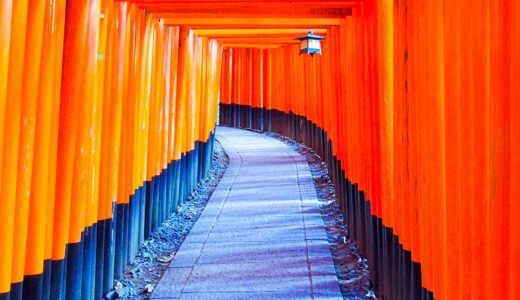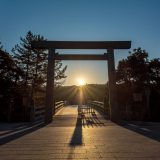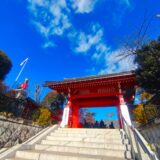【Toji Temple summary】
Toji Temple is the head temple of the Shingon sect of Buddhism. The Shingon sect is a Mahayana Buddhist sect founded by Kukai in the early 9th century and is one of the Japanese Buddhist sects. Its official name is Kyo-o-gokoku-ji Temple, and it is one of the cultural assets of the ancient capital of Kyoto, a World Heritage Site. The temple was built over 1,200 years ago to protect the capital from the relocation of the capital to Heian-kyo. The West Temple has fallen into decline and now only remains, but the East Temple was later entrusted by Emperor Saga to Kobo Daishi, and has become the first Shingon esoteric Buddhism temple in Japan. It is famous for its five-story pagoda, the tallest in Japan, its monthly flea market, and its 130-year-old Fuji-zakura cherry tree.
【Toji Temple precincts】
![Toji Temple and Yashima Shrine Pavilion [Kyoto] DSC 0688 1024x681 - Toji Temple and Yashima Shrine Pavilion [Kyoto]](https://japan-shrine.info/wp-content/uploads/DSC_0688-1024x681.jpg)
Once inside the gate, the temple grounds are spacious. The main hall, Mikageido, enshrines Kobo Daishi and Fudo Myoo. There are other halls and shrines on the temple grounds.
![Toji Temple and Yashima Shrine Pavilion [Kyoto] DSC 0693 1024x768 - Toji Temple and Yashima Shrine Pavilion [Kyoto]](https://japan-shrine.info/wp-content/uploads/DSC_0693-1024x768.jpg)
There are many historical buildings such as the five-story pagoda and Kondo Hall, and there are numerous attractions. The “three-dimensional mandala,” a visual representation of the teachings of esoteric Buddhism, in the lecture hall, a building built by Kukai to propagate and spread esoteric Buddhism, is a must-see. Please note that photography is prohibited.
![Toji Temple and Yashima Shrine Pavilion [Kyoto] DSC 0690 1024x768 - Toji Temple and Yashima Shrine Pavilion [Kyoto]](https://japan-shrine.info/wp-content/uploads/DSC_0690-1024x768.jpg)
The five-story pagoda is the focus of most people’s attention, but Yashima Shrine, the origin of To-ji Temple, is also located within the temple grounds. The shrine is dedicated to Okuninushi no Mikoto, the deity of the landowners who resided there before To-ji Temple was built. According to Kojiki, Japan’s oldest history book, and Nihonshoki, Japan’s oldest authentic history, Okuninushi no Mikoto is the sixth grandson of Susano no Mikoto, the god who created the country of Japan. He is also regarded as the ancestral deity of the Izumo no Kuni no Miyatsuko and the deity of Izumo Taisha Shrine.
![Toji Temple and Yashima Shrine Pavilion [Kyoto] DSC 0691 1024x768 - Toji Temple and Yashima Shrine Pavilion [Kyoto]](https://japan-shrine.info/wp-content/uploads/DSC_0691-1024x768.jpg)
It is not unusual to find shrines within Buddhist temples, but the tradition of carefully preserving the ancient beliefs without exterminating them is truly wonderful.
【Toji Temple scenery】
![Toji Temple and Yashima Shrine Pavilion [Kyoto] DSC 0693 2 1024x768 - Toji Temple and Yashima Shrine Pavilion [Kyoto]](https://japan-shrine.info/wp-content/uploads/DSC_0693-2-1024x768.jpg)
Originally built in 826 A.D., the pagoda was destroyed by fire four times, including by lightning, and the current five-story pagoda is the fifth, which was rebuilt in 1644 with donations from Tokugawa Iemitsu. In autumn, the pagoda is beautifully illuminated with autumn leaves, giving it a different beauty and solemnity than during the daytime.
【Toji Temple Nearby attractions】
【Toji Temple Access】
Manager’s Comments
The five-story pagoda is a landmark of Kyoto. It is also known as the tallest existing wooden structure in Japan. You can enjoy it in each of the four seasons, including the scenery. Next time, I would like to visit during the cherry blossom season.
1 Kujo-cho, Minami-ku, Kyoto, 601-8473, Japan
Paid parking available
 Tour of Japanese shrines and temples
Tour of Japanese shrines and temples 


![Toji Temple and Yashima Shrine Pavilion [Kyoto] DSC 0724 150x150 - Toji Temple and Yashima Shrine Pavilion [Kyoto]](https://japan-shrine.info/wp-content/uploads/DSC_0724-150x150.jpg)
![Toji Temple and Yashima Shrine Pavilion [Kyoto] shimogamo shrine kyoto jp1 150x150 - Toji Temple and Yashima Shrine Pavilion [Kyoto]](https://japan-shrine.info/wp-content/uploads/shimogamo-shrine-kyoto-jp1-150x150.jpg)
![Toji Temple and Yashima Shrine Pavilion [Kyoto] Gen Ise nekomiya Imperial Grand Shrine【Kyoto】3 150x150 - Toji Temple and Yashima Shrine Pavilion [Kyoto]](https://japan-shrine.info/wp-content/uploads/Gen Ise-nekomiya Imperial Grand Shrine【Kyoto】3-150x150.jpg)
![Toji Temple and Yashima Shrine Pavilion [Kyoto] DSC 2153 150x150 - Toji Temple and Yashima Shrine Pavilion [Kyoto]](https://japan-shrine.info/wp-content/uploads/DSC_2153-150x150.jpg)

